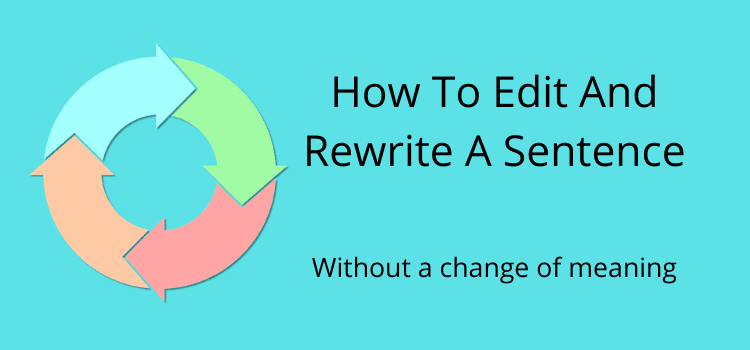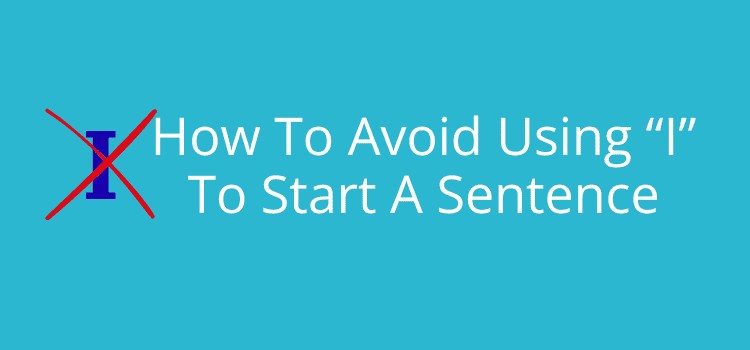
Every writer needs to know how to rewrite a sentence. It’s always part of editing to add variety to your writing or make certain elements more precise or powerful.
It’s not quite the same as paraphrasing because that can be when you take words from another source and turn them into your own words.
Rewriting parts of your text help improve your writing and make it more readable and understandable.
All you need to do is ask yourself, can I say this another way?
Why do you need to rewrite sentences?
The two most common reasons are to add variety and to improve clarity.
When you notice a group of sentences with the same grammar structure or syntax, it makes for boring reading. Changing some sentences will solve the problem.
I went fishing, but I didn’t catch any fish. But my brother came fishing with me too. He caught a huge trout by luck.
Although I didn’t catch anything when my brother and I went fishing, he got lucky and caught a huge trout.
When you see a simple subject-verb-object sentence, such as “she did this” or “I did that”, it’s always a good candidate to change.
Jane likes fish.
It’s fish that Jane likes.
What Jane likes is fish.
Using it or what to start a sentence in the examples above creates a cleft sentence.
It allows you to add more emphasis to either the subject or the object.
Make a sentence clearer
Sometimes, we use sentences that are not entirely clear in meaning.
You know what you want to say, but it might not be evident to a reader.
If I use the same example as above, Jane likes fish; it is an unclear sentence because like is a weak verb.
It is a verb that says little because it is a generalization.
Does she like to eat it, or is she fascinated with fish?
You could solve the problem in many ways.
But the easiest way is to add a more specific, stronger verb to help improve clarity.
Jane likes to eat fish.
Jane likes to catch fish.
Jane likes to keep fish.
Jane likes to study fish.
Jane likes to breed fish.
Yes, it’s a simple change.
But now, each sentence is much more precise in meaning.
Change your vocabulary
Changing the main verb in a sentence is a quick way to make an improvement.
It helps you adjust the register to formal or informal to suit your text.
A bomb exploded early this morning outside the office of a local politician. (Formal)
A bomb went off early this morning outside the office of a local politician. (Informal)
The company has decided to cancel the release of its new product. (Formal)
The company has decided to call off the release of its new product. (Informal)
There is concern amongst businesses about the low level of interest rates. (Formal)
Businesses are said to be worried about the low level of interest rates. (Informal)
Another option is to use a noun phrase to emphasize a point.
The latest economic news states that there have been more redundancies this year than the year before.
In the latest economic news, it says that there has been a rise in the number of redundancies this year compared to the year before.
Reverse conditional sentences
By far, the easiest sentences to change are conditionals. You can change the clause order for all of the conditional forms.
Another way to rewrite a first conditional is to replace if with should or when.
If I win the lottery, I’ll buy a Ferrari.
I’ll buy a Ferrari if I win the lottery.
Should I win the lottery, I’ll buy a Ferrari.
If I had a rocket, I would fly to the moon.
I would fly to the moon if I had a rocket.
I’ll tell Susan the news if I see her.
When I see Susan, I’ll tell her the news.
Change passive voice to active
Without a doubt, this is the most frequent change you make in writing.
Whenever you see a passive sentence, you should consider changing your sentence to the active form.
I had a nasty infection, but after I was prescribed a course of antibiotics, I was fine. (Passive)
I had a nasty infection, but after my doctor prescribed a course of antibiotics, I was fine. (Active)
If you are working overseas, your passport can be renewed at your embassy. (Passive)
If you are working overseas, you can renew your passport at your embassy. (Active)
My silence was mistaken for agreement. (Passive)
They mistook my silence for agreement. (Active)
However, there are times when the passive form is the best option.
You use it when the actor is unknown to avoid repetition or don’t want to attribute blame.
My car was stolen on Saturday night.
Someone stole my car on Saturday night.
You could change it, but the active voice can sound awkward.
The house will be auctioned on Saturday.
The house will be auctioned on Saturday by an auctioneer.
An auctioneer will auction the house on Saturday.
In this example, rewriting the sentence and using the active form makes no sense because it creates unnecessary repetition.
Simplify complex sentences
When you want to rewrite a sentence that contains multiple clauses, you need to do some gymnastics.
With complex sentences, look for the most important words in the sentence. These are usually the subject, the verb or verbs, and perhaps an object.
I think it would be a good idea for you to speak to your lawyer before you decide what to do.
If I were you, I would speak to your lawyer before deciding what to do.
In the example above, the second sentence removes the wordiness and is more precise. But it still retains the three essential elements.
When talking about a past time, you can often change past simple to used to. It makes it clear that a past action doesn’t happen anymore.
I was very nervous about driving on the left at first, but now I’m okay with it.
I’m okay with driving on the left now, but I used to get very nervous at first.
In other words
When people say something they think people don’t understand, they say, I’ll put it another way or let me rephrase that.
You can apply the same logic to your writing.
When you look at any sentence, think about how you can say it another way. If you use a grammatical expletive, it is always worth changing.
You can use many options and possibilities to change a sentence but still maintain its essential meaning.
All you need to do is think about changing your vocabulary and grammar structures or re-ordering a phrase or sentence.
But one last word of advice.
You might think it’s easier to use a paraphrasing tool to help you. But the results are often clumsy and unwieldy.
It’s always better to rewrite a sentence yourself, and in the process, you will learn more and more new ways to improve your writing.
Related reading: How To Use Inversion In Writing To Improve Your Variety
Share This Article



Many thanks for all the samples that you gave to show how to improve my writing